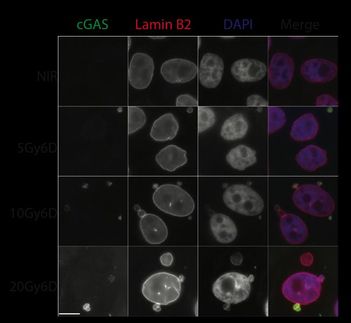VCU Massey Center researchers identify a new class of anti-cancer drugs based on platinum
Researchers at Virginia Commonwealth University's Massey Cancer Center have created a new platinum-based, anti-cancer agent able to overcome acquired drug resistance by first modifying the way it is absorbed into cancer cells and then attacking the DNA of those cancer cells. The findings may help researchers design a new generation of anti-cancer drugs that selectively target cancer cells, reduce resistance and side effects and expand the range of tumors that can be treated by platinum.
In the journal Inorganic Chemistry researchers reported on the design of a new trinuclear platinum compound and demonstrated that its cellular absorption is significantly greater than that of neutral cisplatin, as well as other multi-nuclear platinum compounds. The enhanced uptake into cancer cells takes advantage of weak molecular interactions on the cells' surface. These results underscore the importance of the new compound's "non-covalent" interactions, prior to the attack on DNA. Non-covalent interactions minimize potential side reactions and produce changes in the structure of proteins and DNA, which is different from currently used drugs.
DNA-damaging agents, such as cisplatin, are among the most effective classes of compounds in clinical use for the treatment of cancer. The principal function of cisplatin is to bind to DNA. Platinum drugs are the largest class of anti-cancer drugs in the clinic and the most important in terms of treatment. Cisplatin is a chemotherapy drug that is given for the treatment of metastatic testicular or ovarian cancers, and some advanced bladder cancer, and is a very effective drug in combination with other therapies.
However, according to Nicholas Farrell, Ph.D., professor and chair in the Department of Chemistry at VCU, these current agents have limited activity against many common human cancers, and they are susceptible to acquired drug resistance. He added that resistance to cisplatin has become a clinically relevant issue - especially for patients battling ovarian cancer because they develop resistance to cisplatin at a rapid rate.
Farrell said that use of the "non-covalent" approach and emphasizing cell uptake may help minimize the side effects of current platinum drugs. He said that both cell uptake and the ability of the cell to minimize the effect of DNA attack, or DNA repair, play a critical role in cellular resistance to cisplatin by altering its ability to effectively kill tumor cells. By understanding the features of cisplatin that contribute to resistance, Farrell and his team designed the new compound to circumvent these problems.
Most read news
Topics
Organizations
Other news from the department science

Get the life science industry in your inbox
By submitting this form you agree that LUMITOS AG will send you the newsletter(s) selected above by email. Your data will not be passed on to third parties. Your data will be stored and processed in accordance with our data protection regulations. LUMITOS may contact you by email for the purpose of advertising or market and opinion surveys. You can revoke your consent at any time without giving reasons to LUMITOS AG, Ernst-Augustin-Str. 2, 12489 Berlin, Germany or by e-mail at revoke@lumitos.com with effect for the future. In addition, each email contains a link to unsubscribe from the corresponding newsletter.




















































